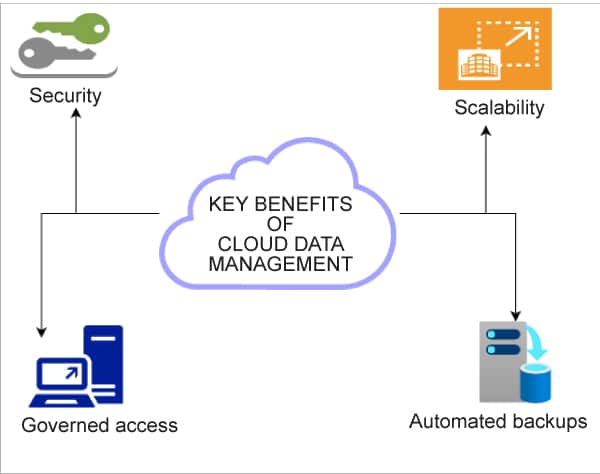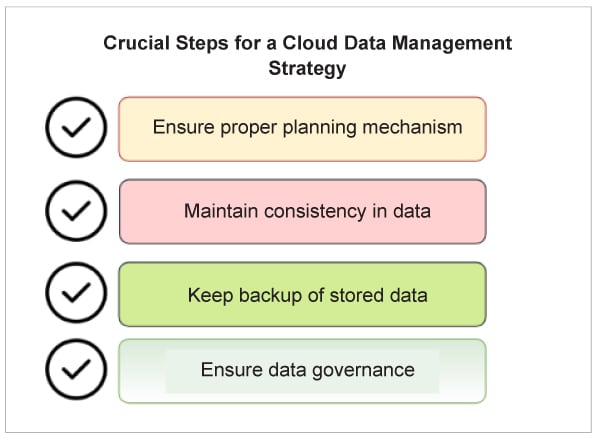Individuals and enterprises are generating data like never before. This data, which is sourced from social media, digital transactions, the Internet of Things (IoT) and company databases, is so complex that an on-premise data storage solution is inadequate. As a result, companies are shifting to cloud based storage. This article takes a quick look at cloud data management and its benefits, and how to handle data on the cloud.
Cloud data management is a method of storing and processing a company’s data in the cloud rather than on-premise. Data management via cloud platforms ensures quick disaster recovery, efficient backup, and accessibility from any location. Also, cloud data management resources can be easily handled thanks to scalability and elasticity features.
Managing data on the cloud is different from the traditional approach
A traditional data warehouse system works well for on-premise data centres. However, an enterprise needs to purchase the hardware, servers and recruit network professionals. Therefore, these days data storage using cloud based platforms is gaining popularity over the traditional on-premise approach. Data storage on cloud platforms is different from traditional on-premise systems in the following ways.
Scalability: A cloud computing data centre offers a large storage space and server resources. Thus, depending upon the data a client wants to store, cloud servers can scale up or down easily. This enables fault tolerance and avoids downtime.
Resilience: The data stored in a cloud server is evenly distributed across all the servers, making them more resilient to threats. Traditional data management systems are not resilient and server performance is limited in their case.
Reduced storage cost: By using cloud data storage services, the end user only pays for the storage resources that are used. But, in a traditional data management system, you need to purchase servers.

Key benefits of cloud data management
Some of the most significant benefits of cloud data management are listed below.
a) Security: Modern cloud data centres ensure high security compared to on-premise solutions. By using cloud services, the risk of data loss and hardware failure is reduced. In contrast to the traditional on-premise approach, cloud hosting companies employ advanced techniques of encryption and authentication.
b) Scalability and savings: Cloud computing platforms offer an enhanced level of scalability compared to the traditional on-premise approach. They offer dynamic addition and release of storage space as well as computing power during peak loads. In the traditional approach, if there is a shortage of computing resources, the user has to purchase the hardware infrastructure.
c) Governed access: In cloud computing, the practice of data governance ensures regulated and monitored access to confidential data. This feature also supports access to data anytime and from anywhere. This is achieved by implementing data governance protocols (authorisations, policies, metadata, etc) in a cloud database system. Thus, by using on-demand access to data and resources, cloud computing offers businesses significant cost savings.
d) Automated backups and disaster recovery: In the traditional approach, a disaster recovery system requires constant maintenance and support. Disaster recovery in cloud computing entails storing critical data and applications in cloud storage and failover to a secondary site in case of a disaster.

Evolving a management strategy for data on the cloud
In the IT industry, cloud data management strategies are critical to achieving corporate goals. The steps below outline how to handle data in a cloud data server.
a) Ensure a proper planning mechanism: Planning is the key to project management success. In cloud data management, for successful dumping of data into the cloud environment the user has to take care of issues such as: i) ensuring that complete data is offloaded to the cloud, ii) implementing proper mechanisms for efficient data access, iii) deciding how data processing will be done at the cloud server.
b) Maintain consistency in data: Data consistency ensures that information stored in the database is accurate and that there is no redundancy in the data.
c) Keep a backup of stored data: Cloud service providers follow the practice of regular backup. In a cloud data centre, regular backup is done by copying data to a remote location server.
d) Ensure data governance: Governance protocols are implemented to ensure regulated and monitored access to data.
With the growth in the size of databases, today’s data managers need a system that can provide ease of access and efficient management of data from any location. To achieve this objective, cloud data management strategies have been widely adopted across multiple industries.



















































































